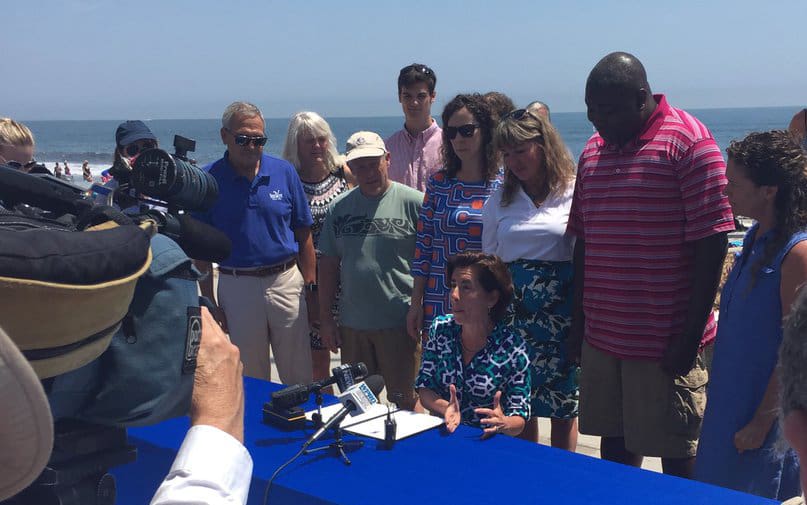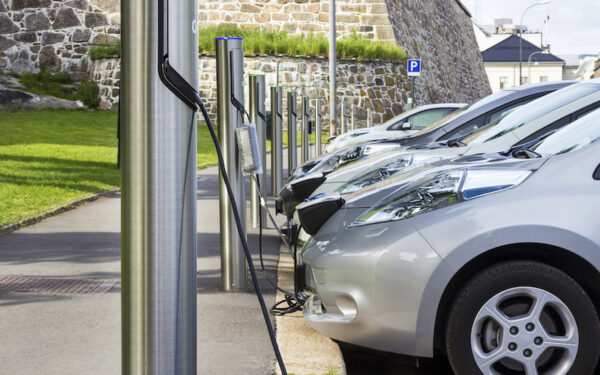
Rhode Island Governor Gina Raimondo signed an Executive Order at Scarborough Beach creating a “Task Force to Tackle Plastics." The task force could make the Ocean State a leader in reducing plastic pollution. Photo: Terrence Gray
On a sunny Monday in July, Rhode Island Governor Gina Raimondo signed an Executive Order at Scarborough Beach creating a “Task Force to Tackle Plastics.” The Task Force has the potential to make Rhode Island a leader on reducing the plastic pollution that is choking the state’s 400 miles of coastline and the ocean waters beyond.
The task force will bring together representatives from Rhode Island industries, environmental groups, and local and state governments to make recommendations on legislation, incentives, and recycling improvements. While this is an important first step in reducing pollution from disposable plastic, it won’t solve the problem if it doesn’t lead to strong legislative and regulatory changes.
Rhode Island must ban single-use plastics to drastically cut plastic pollution and push the state closer to Zero Waste.
Plastic is a Dirty Material from Day One
Plastics pollute our communities and environment at every stage of their manufacture and use. They are made from oil, and fracking in the U.S. has allowed for a greater output of them. About 8 percent of global petroleum consumption is made into plastics each year, and that number will jump to 20 percent by 2025 if we don’t slow down generation. We should be reducing our reliance on fossil fuels, not expanding it.
Eight million metric tons of plastic are dumped or swept into our oceans each year, killing sea life, filling beaches, and breaking down into hazardous microplastics. Since 2006, Clean Ocean Access has picked up over 94,000 pounds of litter– mostly plastic-based – from the Aquidneck Island shoreline alone. If we don’t change our plastic habits, by 2050, our world’s oceans will contain more plastic than fish.
What’s more, the production of plastics can incorporate dangerous chemicals such as benzene, used to make plastic foam containers and packing peanuts. When we throw these plastics away, they leach these toxins into the groundwater or, when burned, release them into the air.
Recycling Isn’t the Answer to Plastic Pollution
Of all the plastic we use in the United States, only about 9 percent is actually recycled. Most gets thrown away and sent to a landfill. But even if we could get to a point where every plastic bag, package, part, or container is put into a recycling bin, we would still have a pollution problem. Our recycling system simply isn’t designed to handle the surge of plastic we’re using.
Recycling was designed for materials like aluminum and steel, not everything we put in our bins today. Recycling is a business and, like any other business, its effectiveness often comes down to profit. Since the price per ton of recycled plastic is often near that of new material, there’s not a robust market for it. With little incentive for recycling companies to collect plastics, many of the plastic items we diligently put in our home bins still end up in a landfill or incinerator, exactly where we don’t want them.
We shouldn’t focus our energy on making changes at the end of plastic’s lifespan.
The Answer is Banning Single-Use Plastics, Period
Plastic isn’t all bad. It has revolutionized medicine, lowered the cost of transportation, and made solar and wind power possible. But blood bags, lighter cars, and wind turbines aren’t washing ashore on New England’s coasts. Instead, our beaches are full of plastic bags, balloons, Styrofoam, plastic straws, cigarette butts, and plastic bottles. None of them are necessary, and all of them pollute. Until we ban single-use plastics, they will continue to fill our landfills, bays, and oceans.
Many communities around the country (like Boston) have passed plastic bag bans, and California and Hawaii both wrote statewide bans into legislation. But the U.S. is woefully behind the more than 60 countries that have successfully placed levies or bans on single-use plastics. Just this year, the entire European Union signed on to a proposal to ban them.
In many of these countries, bans on plastic bags have been very successful. Ireland saw a 94 percent drop in plastic bag use within one year of its 2002 law, and Rwanda has measurably less flooding and erosion as an outcome of its 2008 ban.
The only successful way to reduce our plastic waste is to eliminate any packaging, container, or item that isn’t designed for reuse. Rhode Island’s Task Force is a good start, but if the state is serious about leading the charge on combating this global issue, the state must ban single-use plastics.



